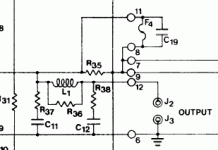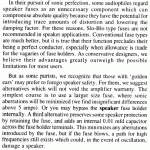Re: BREEK ME DE BEK NIET OPEN...
Hi Frank,
Don't be afraid , Those days of eardeafening soundpressure levels are long over.
The fuses are there in case of malfunction or in the case I put on my 2x 300Watt poweramp and after that my preamp. 1A (gray) fuses also work.
I don't have experience with other cylindrical gold plated audiophile glass fuses.
But as Jonathan remarks correctly a tight fit to make good contact is important. A bad old fuse can be a source of distortion.
😉
fdegrove said:Hi Elso,
Car type fuses in your Klipschorns?
Are you sure those are needed at all?
I made my own KHs at the age of 14 and never had any trouble with the speakers without the fuses.
Other than that, what's your prefered type? other than those 3A cartype things...
Cheers,😉
Hi Frank,
Don't be afraid , Those days of eardeafening soundpressure levels are long over.
The fuses are there in case of malfunction or in the case I put on my 2x 300Watt poweramp and after that my preamp. 1A (gray) fuses also work.
I don't have experience with other cylindrical gold plated audiophile glass fuses.
But as Jonathan remarks correctly a tight fit to make good contact is important. A bad old fuse can be a source of distortion.
😉
FUSED, NOT YET DETONATED...
Hi,
To all fuses involved..I'll ask peter to move everything relevant to fuses to a new thread.
Cheers,😉
P.S. Peter, I suppose you can monitor the creation of a new thread?
Hi,
To all fuses involved..I'll ask peter to move everything relevant to fuses to a new thread.
Cheers,😉
P.S. Peter, I suppose you can monitor the creation of a new thread?
Hi,
Most of us already are aware of the detrimental effect fuses and fuseholders can have on the sound of our cherished audiogear...
What can be done about it?
Suggestions are welcomed.
Cheers,😉
Most of us already are aware of the detrimental effect fuses and fuseholders can have on the sound of our cherished audiogear...
What can be done about it?
Suggestions are welcomed.
Cheers,😉
Fred,
Strange, a few months ago, in a private e-mail to me you accused me of sucking up to Jonathan Carr, and now............😀 😀 😀
Regards,
Jam
Strange, a few months ago, in a private e-mail to me you accused me of sucking up to Jonathan Carr, and now............😀 😀 😀
Regards,
Jam
'splain pls.????
Hi,
You owe us all a 'splanation too before I blow a phrrrruse...
Get it out in the open fellowz, it's soo much better.
Cheers,😉
Hi,
Strange, a few months ago, in a private e-mail to me you accused me of sucking up to Jonathan Carr, and now.........
You owe us all a 'splanation too before I blow a phrrrruse...
Get it out in the open fellowz, it's soo much better.

Cheers,😉
jam said:Fred,
Strange, a few months ago, in a private e-mail to me you accused me of sucking up to Jonathan Carr, and now............😀 😀 😀
Regards,
Jam
If Jonathan would have wanted to keep it private he would have probably addressed the email to fred directly, ahh but there is that corollary of fred's email address not working. Fred has a very selective memory, plus the general rules of the world never applied to him. That's one of the reasons why we love him 😉
What would this place be without Jam to keep us laughing at ourselves. I hope we don't have to find out.
Jocko.....in a non-smacking mood
Jocko.....in a non-smacking mood
Most of us already are aware of the detrimental effect fuses and fuseholders can have on the sound of our cherished audiogear...
Do I understand correctly that this refers to the LINE or MAINS fuse at the power entry to the unit? (there are too many 😉 in this thread to be sure of anything). That would be the same fuse which comes before a step-down transformer, and a rectifier, and a few thousand uF of filter capacitance with a couple metal film caps thrown in for good measure (before you get to the real regulator, that is)...
So if the inductance or resistance of the fuse on the 50/60Hz line really ads to the distortion or other artifacts on the output, how do you feel about the typical RF and EMI line filter with its common and differential mode chokes, transzorbs, and so on?
PM
FUSED...
Hi,
While I can't speak for anyone else, I feel the greatest deteriation in sound comes from those fuses on the othe side of the fence.
In this case on the secondary side of the powerxformer.
A lot of the commercial units I know of are just acting like dynamic compressors to my ears, just O.K. for use in a CDP or DAC or any other low power application.
No doubt there'll be good ones around but the price is often so steep that I can't be bothered.
A lot of RF and EMI can be tackled by careful design anyway.😎
Cheers,😉
Hi,
While I can't speak for anyone else, I feel the greatest deteriation in sound comes from those fuses on the othe side of the fence.
In this case on the secondary side of the powerxformer.
how do you feel about the typical RF and EMI line filter with its common and differential mode chokes, transzorbs, and so on?
A lot of the commercial units I know of are just acting like dynamic compressors to my ears, just O.K. for use in a CDP or DAC or any other low power application.
No doubt there'll be good ones around but the price is often so steep that I can't be bothered.
A lot of RF and EMI can be tackled by careful design anyway.😎
Cheers,😉
PMiczek said:
So if the inductance or resistance of the fuse on the 50/60Hz line really ads to the distortion or other artifacts on the output, how do you feel about the typical RF and EMI line filter with its common and differential mode chokes, transzorbs, and so on?
I like them in DACs but not in amps. Didn't check line stages yet, as I didn't have chance to use them.
Re: FUSED
About what I thought.
If correct, this would not be good news. I thought that even a home made line filter made from a Panasonic common mode choke (for about $2-$5 @Digikey, depending on current rating), and a few other cheap components improved sound in situations where I suspected noisy line (mains) supply. They are really designed to prevent noise emissions, but I have had the impression they work equally well to keep noise out. I should say these were not applied to power amps, but CDPs, commercial pre's and similar with < 1A supplies.
This is really something from industrial design for test instrumentation and DAQ and such to prevent noise from other nearby sources (like flyback type supplies, high-voltage switching supplies) and solenoids, so it may not apply to audio as much. I have tried it mainly because I was surprised at the amount of noise on some home AC circuits. Personal computers, battery chargers, switching wall wart supplies etc come to mind.
It _seemed_ it had a positive effect at the time. (shrug)
btw, I agree that it is better to stop noise at the source rather than fight it later, but sometimes that is not an option.
Thx for the comments.
While I can't speak for anyone else, I feel the greatest deteriation in sound comes from those fuses on the othe side of the fence.
About what I thought.
A lot of the commercial units I know of are just acting like dynamic compressors to my ears, just O.K. for use in a CDP or DAC or any other low power application.
If correct, this would not be good news. I thought that even a home made line filter made from a Panasonic common mode choke (for about $2-$5 @Digikey, depending on current rating), and a few other cheap components improved sound in situations where I suspected noisy line (mains) supply. They are really designed to prevent noise emissions, but I have had the impression they work equally well to keep noise out. I should say these were not applied to power amps, but CDPs, commercial pre's and similar with < 1A supplies.
This is really something from industrial design for test instrumentation and DAQ and such to prevent noise from other nearby sources (like flyback type supplies, high-voltage switching supplies) and solenoids, so it may not apply to audio as much. I have tried it mainly because I was surprised at the amount of noise on some home AC circuits. Personal computers, battery chargers, switching wall wart supplies etc come to mind.
It _seemed_ it had a positive effect at the time. (shrug)
btw, I agree that it is better to stop noise at the source rather than fight it later, but sometimes that is not an option.
Thx for the comments.
Re: Fuse bypass?
If you put it technically, care must be taken if the load is low-ohmish and/or the currents are small. In general, all contacts are critical when the currents are low.
I don't think that fuses on the power lines have a certain sound but my speaker fuses sounded one day real nasty, or the speakers produced nasty sound. The problems was bad contact, after a couple of years in use. The fuseholders were plain panel mounted "Schurter".jcarr said:Dear Fred:
While we are on the subject of regulators and power supplies, on a previous occasion, I recall you mentioning that bypassing the fuse-holder on the primary side of an AC mains transformer with a small-value capacitor could have a beneficial effect on the sonics of an amplifier. ...
If you put it technically, care must be taken if the load is low-ohmish and/or the currents are small. In general, all contacts are critical when the currents are low.
what about concern for output fuses, anyone?
Sherman and Peabody's "way-back" machine pointed me to the venerable (?) Hafler DH200 schematic (page 14) from which the pic below was cut.
The fuse is incorporated into the overall feedback loop. The cap across the fuse (C19) is a 4.7nF/100V film of some sort. The resistor across the fuse (R35) is 2K2 ohms/1W, probably carbon film in those times. I'm sure you guys can do better these days 🙂
Curiously, this approach doesn't appear to be used in the later XL280 or the even later TransNova stuff.
Have fun ...
mlloyd1
Sherman and Peabody's "way-back" machine pointed me to the venerable (?) Hafler DH200 schematic (page 14) from which the pic below was cut.
The fuse is incorporated into the overall feedback loop. The cap across the fuse (C19) is a 4.7nF/100V film of some sort. The resistor across the fuse (R35) is 2K2 ohms/1W, probably carbon film in those times. I'm sure you guys can do better these days 🙂
Curiously, this approach doesn't appear to be used in the later XL280 or the even later TransNova stuff.
Have fun ...
mlloyd1
Attachments
Hafler and speaker fuses, again ...
Ooops, I just found this in the XL280 manual.
mlloyd1
edit: added a link for the curious: Hafler XL280
Ooops, I just found this in the XL280 manual.
mlloyd1
edit: added a link for the curious: Hafler XL280
Attachments
DH200 fuses
Well I understand the concern about fuses in the path to the speaker, small as it may be, but I noticed they did not see a need for bypassing any of the 5 fuses in the power supply section with capacitors, neither the one on the line side, nor on the output of the filter caps...
PM
Well I understand the concern about fuses in the path to the speaker, small as it may be, but I noticed they did not see a need for bypassing any of the 5 fuses in the power supply section with capacitors, neither the one on the line side, nor on the output of the filter caps...
PM
They SUCK!
They suck, big time.
They don't work as described (being tested and designed within 50R loads as defined by the EMC reg's, yet are used with MUCH lower Z than this).
They raise line impedance, and even upset other kit by just being plugged into the same mains socket as non-filtered items.
Cue the barrage of disagreement...
Andy.
BTW Fred, we never tire of hearing from you 😉
So if the inductance or resistance of the fuse on the 50/60Hz line really ads to the distortion or other artifacts on the output, how do you feel about the typical RF and EMI line filter with its common and differential mode chokes, transzorbs, and so on?
They suck, big time.
They don't work as described (being tested and designed within 50R loads as defined by the EMC reg's, yet are used with MUCH lower Z than this).
They raise line impedance, and even upset other kit by just being plugged into the same mains socket as non-filtered items.
Cue the barrage of disagreement...
Andy.
BTW Fred, we never tire of hearing from you 😉
Re: They SUCK!
ALW said:
They suck, big time.
They don't work as described (being tested and designed within 50R loads as defined by the EMC reg's, yet are used with MUCH lower Z than this).
-----------------------------------------------------
Agree; I try to remove them and separate analogue and digital equipment using ac regenerators.
I have just done an experiment on a Sony SCDXB940 I have been modifying. I originally installed an electronic fuse of low impedance and when I bypassed with a .01 uF X2 PP cap, some of the dynamics os SACD playback was lost. SACD sounded rather close to CD. I then removed the fuse altogether, and the difference between SACD and Cd became much more discernable. The sound was better too in the bass abd treble regions.
Bypassing the two BF FK coupling caps with .01 uF PP Wima FK2 film had a bigger adverse effect in squashing dynamics.
I must now find a decent fuse to solder on.
Improbable history and other lies
Man it is a good thing I didn't post my reply in light of the more scholarly post by my peers......
mlloyd1 shares one of my most cherished cultural icons! The DIYAUDIO wayback search engine yeilded the following:
http://www.diyaudio.com/forums/showthread.php?postid=20696#post20696
My spell checker thinks mlloyd1 is "melody" but I find he usally has the words as well.
"BTW Fred, we never tire of hearing from you"
Andy either has the most keenly devoted sense of irony I have ever encountered, or is terrible at lying, an understandable defect, stemming from his lack of experience the art I'm sure. please feel free to practice on me any time. A man of my skills however, could make you absolutely proficient at it, in a matter of few hours.
For inspiration, I give you:
From Mark Twain's speech "Our Fellow Savages of the Sandwich Islands"
"But if you want to trade, that's quite another matter--that's business! And the Kanucker is ready for you. He is a born trader, and he will swindle you if he can. He will lie straight through, from the first word to the last. Not such lies as you and I tell, but gigantic lies, lies that awe you with their grandeur, lies that stun you with their imperial impossibility. He will sell you a molehill at the market price of a mountain, and will lie it up to an altitude that will make it cheap at the money. If he is caught, he slips out of it with an easy indifference that has an unmistakable charm about it."
Man it is a good thing I didn't post my reply in light of the more scholarly post by my peers......
mlloyd1 shares one of my most cherished cultural icons! The DIYAUDIO wayback search engine yeilded the following:
http://www.diyaudio.com/forums/showthread.php?postid=20696#post20696
My spell checker thinks mlloyd1 is "melody" but I find he usally has the words as well.
"BTW Fred, we never tire of hearing from you"
Andy either has the most keenly devoted sense of irony I have ever encountered, or is terrible at lying, an understandable defect, stemming from his lack of experience the art I'm sure. please feel free to practice on me any time. A man of my skills however, could make you absolutely proficient at it, in a matter of few hours.
For inspiration, I give you:
From Mark Twain's speech "Our Fellow Savages of the Sandwich Islands"
"But if you want to trade, that's quite another matter--that's business! And the Kanucker is ready for you. He is a born trader, and he will swindle you if he can. He will lie straight through, from the first word to the last. Not such lies as you and I tell, but gigantic lies, lies that awe you with their grandeur, lies that stun you with their imperial impossibility. He will sell you a molehill at the market price of a mountain, and will lie it up to an altitude that will make it cheap at the money. If he is caught, he slips out of it with an easy indifference that has an unmistakable charm about it."
Attachments
- Status
- Not open for further replies.
- Home
- Amplifiers
- Solid State
- Fuses,fuseholders And How To Make Them Sound Better...



